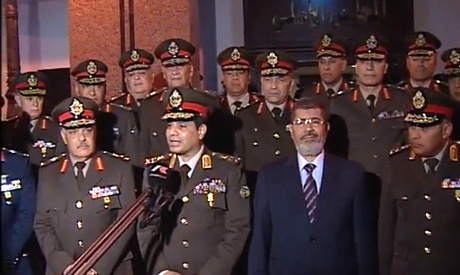
Egyptian President Mohamed Morsi stands next to Field Marshal Abdel Fattah El-Sisi in the company of the Supreme Council of Armed Forces after a meeting on Thursday, 11 April 2013.
President Mohamed Morsi "understands the implications of harming the image of Egypt's military," Defence Minister Abdel-Fattah El-Sisi, head of Egypt's supreme military council, said in a statement following a Thursday night meeting with the president.
The armed forces is affected by any allegations made against it, El-Sisi said, saying that the army had not stood against the people during Egypt's 25 January 2011 revolution, after which it assumed responsibility for the country until Morsi's election last summer.
He asserted that the military did not kill civilians, "as some are saying."
In his statement, El-Sisi noted that President Morsi had expressed his full support and complete trust in the Supreme Council of the Armed Forces (SCAF) and the military overall.
Morsi, for his part, has stated his rejection of any abuse directed against the army or its members.
A leaked presidential report mentioned by UK daily The Guardian this week cited brutal human rights violations by army officers and doctors during the SCAF's post-revolution rule.
Clashes between the military and protesters during the period of military administration led to the death of dozens of civilians. The army repeatedly denied its involvement in the killings, save for one case – judged by a military tribunal – when three conscripts were sentenced to several years in jail for 'involuntary manslaughter' after driving armed vehicles over protesters in 2011.
Thursday's meeting was aimed at thawing tense relations between the army and presidency, state news agency MENA reported.
Tension between the two began in late 2012, when the SCAF invited the presidency and opposition forces for a 'national dialogue' session – a move perceived as a tacit threat of military intervention.
The initiative came following Mori's controversial 22 November constitutional declaration, which temporarily made the president's decisions impervious to judicial oversight.
Tensions were stoked further when rumours circulated in February that El-Sisi was about to be dismissed from his post as defence minister. The rumours were categorically denied by El-Sisi soon afterwards.
The rumour brought sharp responses from military officers, who warned of attempts to place Muslim Brotherhood members or associates in key military positions. El-Sisi himself implied that such attempts would fail in a speech delivered in March.
Short link: